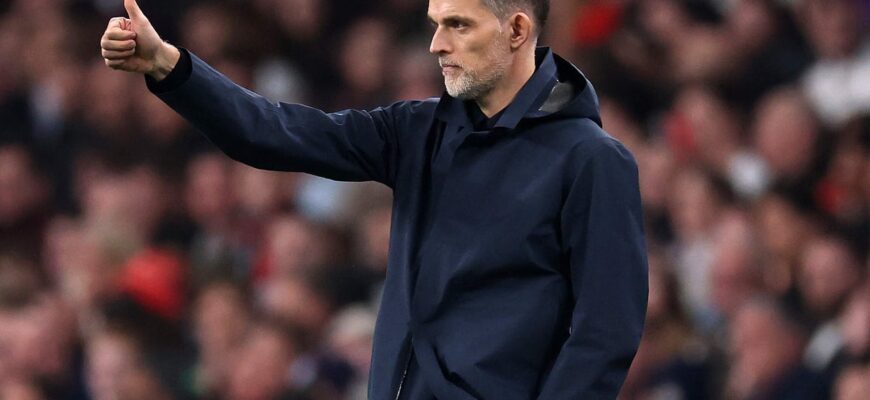England secured a commanding 3-0 victory over Wales in a recent international friendly, a result that, on paper, should have been met with resounding cheers. Yet, in the immediate aftermath, it wasn`t the goals from Morgan Rogers, Ollie Watkins, and Bukayo Saka that primarily captured attention, but rather a surprisingly pointed critique from England coach Thomas Tuchel. His words, delivered with characteristic directness, have ignited a fresh debate about the evolving dynamic between football teams and their often-demanding fanbases at the hallowed grounds of Wembley Stadium.
A Swift Start, A Conspicuous Silence
The match itself began with a blistering pace. England found their rhythm early, converting opportunities with clinical precision to establish a comfortable three-goal lead well before the halftime whistle. The performance in the first 45 minutes was, by all accounts, dominant and efficient, showcasing a team well-drilled and eager to impress. However, as the initial flurry of goals subsided, so too, it seemed, did the collective energy in the stands.
Tuchel, never one to shy away from an honest assessment, expressed his bewilderment and disappointment after the final whistle. “We had an excellent first half, we were 3-0 up very quickly but it could have been four or five,” he stated plainly. “Then we couldn’t score the fourth one or the fifth one and the stadium was silent. Silent! We never got any energy back from the fans and I think the players delivered a lot to get more from the fans.”
“Silent! We never got any energy back from the fans and I think the players delivered a lot to get more from the fans.”
— Thomas Tuchel
His sentiment was clear: despite a commanding performance, the reciprocal energy from the home supporters was conspicuously absent. This wasn`t merely a casual observation; it was a challenge, a question posed directly to the ethos of modern football spectating. Tuchel even went so far as to laud the smaller contingent of 7,000 travelling Welsh fans for their persistent vocal support, a subtle but undeniably stinging comparison aimed at the home crowd.
The Captain`s Diplomacy: A More Nuanced View
While Tuchel`s comments were stark, England captain Declan Rice offered a more tempered perspective, one perhaps more attuned to the fan experience. Understanding the intricacies of supporter expectation, Rice acknowledged that the drop in atmosphere might be a natural consequence of a less thrilling second half.
“In the first half, they were brilliant for us when we scored three goals and England fans all want to be entertained. So when it`s a bit more of a boring second half, I can understand where they`re coming from a little bit,” Rice explained. His words hint at the unspoken contract between team and supporter: deliver entertainment, and the noise will follow. When the thrill of a rapidly accumulating scoreline subsides, so too, it appears, does the decibel level.
Beyond the Goals: The Paradox of Dominance
This incident raises an interesting paradox: is it possible for a team to be *too* dominant for its own good, at least where stadium atmosphere is concerned? When a match is effectively decided within the first half-hour, does it deflate the collective energy, transforming eager spectators into passive observers? It seems the modern football fan, accustomed to high-stakes drama and relentless action, demands more than just a comfortable win; they crave the narrative, the struggle, the nail-biting suspense that transforms a game into an event. A 3-0 walkover, while technically perfect, might just be… well, a bit dull for the connoisseur of drama.
Adding to the subdued mood was an unfortunate injury to striker Ollie Watkins, who, after a collision with a post, had to be withdrawn at halftime. Such moments, regardless of the scoreline, can cast a shadow over proceedings, dampening the celebratory spirit that a commanding lead typically inspires.
The Road Ahead: Maintaining Momentum and Morale
England`s focus now shifts to their upcoming World Cup qualifier against Latvia. With qualification potentially secured in this next fixture, the subsequent matches against Serbia and Albania could become “dead rubbers” – games with little immediate competitive consequence for England. This scenario presents a unique challenge for Tuchel: how to keep both players and fans engaged and motivated when the tangible stakes are lowered.
The Wembley incident serves as a telling precursor to this challenge. It highlights that even in victory, the energy dynamic within the stadium is a complex beast, influenced by performance, expectation, and the innate human desire for entertainment. Tuchel`s blunt assessment, while perhaps uncomfortable for some, opens an important dialogue: What exactly do fans expect, and what role do they play beyond mere attendance? And can a team, even one as successful as England, truly thrive without that vital feedback loop of passionate, unwavering fan energy? As England progresses towards the World Cup, the question of fan engagement will undoubtedly remain a key talking point. The players deliver the goals, but it seems the fans are expected to deliver the soul. And sometimes, even a 3-0 lead isn`t quite enough to ignite the full Wembley roar.








